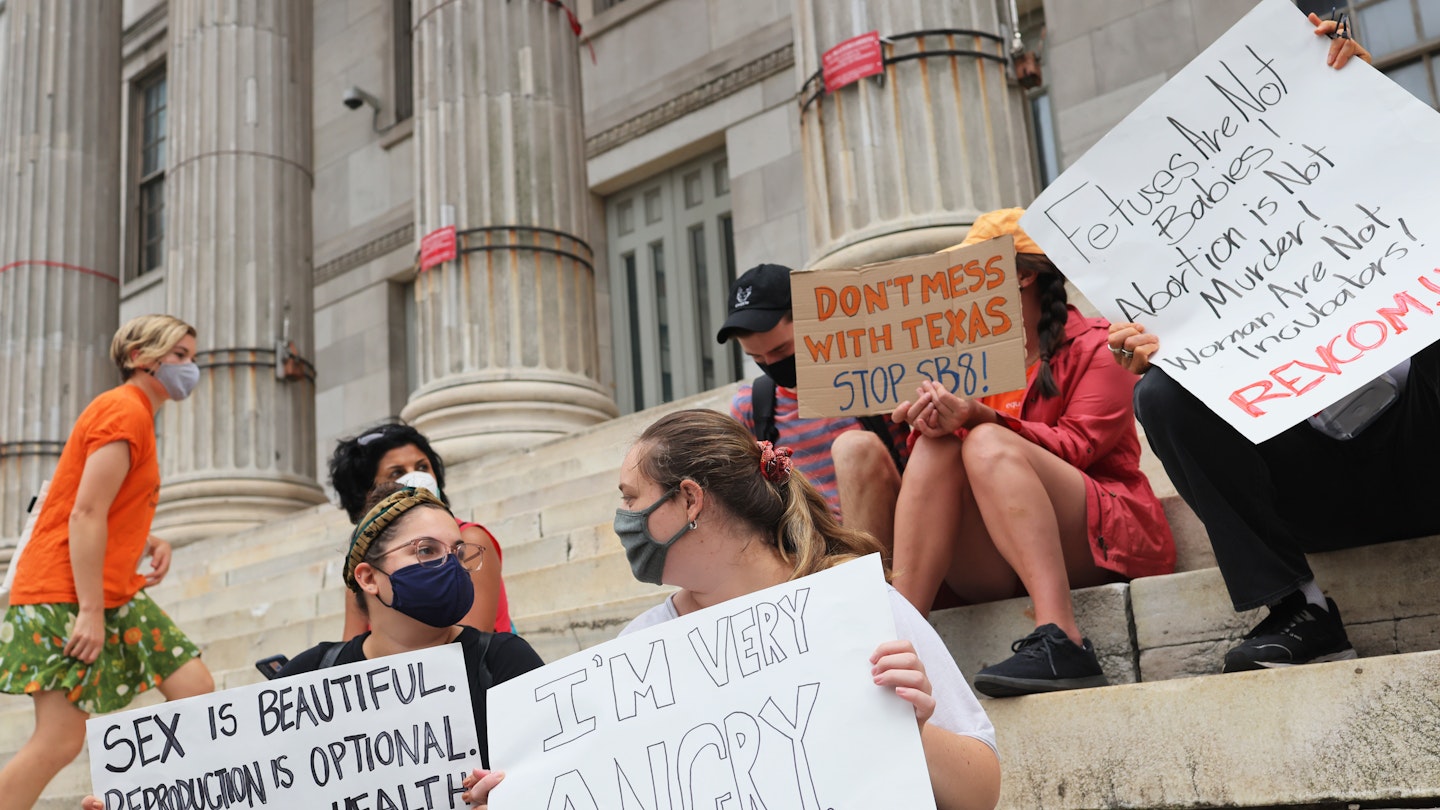Last night, a Texas law that bans abortion from the point cardiac activity is detected was allowed to pass by the US supreme court. It is the strictest law against abortion rights since Roe vs. Wade in 1973, and has been condemned by US president Joe Biden as a blatant violation of constitutional rights.
Making shockwaves across the globe, ‘Texas abortion bill 2021’ is now trending on Google in the UK as people seek to understand more about the devastating development.
What is the Texas abortion ban and how did it happen?
The terrifying law means that abortion will be banned from around six weeks –the typical time cardiac activity is detected – which is before many women know they are pregnant. In figures, that means 85% of women in Texas will now lose access to abortion care, a statistic based on the number of women whose pregnancy is not detected until after six weeks.
The ban does not make exceptions for pregnancies resulting from rape or incest. In fact, the only exception is in cases of medical emergency, which requires written proof from a doctor.
So far, 12 other states have attempted to enact bans on abortion in early pregnancy, so-called ‘heartbeat’ bills, but all were blocked by the supreme court. The difference between them and the Texas law though, is that the others relied on criminal penalties or regulatory punishment for those seeking abortion after six weeks.
Instead, the Texas law authorises ‘a private civil right of action’ meaning that people can sue to enforce the law even if they themselves have not been harmed. It incentivises private citizens to bring civil suits against abortion providers or anyone who ‘aids or abets’ the procedure, meaning that people like clinic staff, family members, or clergy who encourage or support the procedure can, in theory, be sued for up to $10,000 (£7,200).
That’s why a number of abortion providers have told reporters they will abide by the law, despite finding it morally and ethically reprehensible.
‘We are all going to comply with the law even though it is unethical, inhumane, and unjust,’ Dr Ghazaleh Moayedi, a Texas abortion provider and OB-GYN, told The Guardian. 'It threatens my livelihood and I fully expect to be sued. But my biggest fear is making sure the most vulnerable in my community, the Black and Latinx patients I see, who are already most at risk from logistical and financial barriers, get the care they need.’
Planned Parenthood have too confirmed they will abide by the law, despite stating it is contrary to best medical practice, and have already been forced to turn away patients who need abortion care when the law comes into effect later this week. A number of other clinics have also completely discontinued abortion services in order to avoid costly lawsuits.
Earlier this week, Texas abortion providers pleaded with the supreme court to block the law from passing, stating in court documents that it would ‘immediately and catastrophically reduce abortion access in Texas.’
The supreme court voted 5-4 to allow the law to pass, with only one of the six conservatives on the court choosing to block the law, Chief Justice John Roberts. The others who voted to block it include liberals Justice Stephen Breyer, Justice Sonia Sotomayor and Justice Elena Kagan.
The White House have now called on Congress to urgently codify Roe v Wade.
Their swift defeat is worrying for future abortion bans in other states then, with Biden now urgently seeking to codify Roe v Wade - which would make it federal law and protect the right to choose by taking the question of safe and legal abortion out of the supreme courts hands. However, that involves a vote in Congress to make Roe vs Wade federal law, which currently has 535 voting members. That includes representatives of 220 democrats, 212 republicans and three vacant, as well as 100 senators - 50 of which are republican, 48 democrat and 2 independent.
But what does it mean for the women of Texas right now? Well, that’s the debate everyone is having on social media today. Because, despite 85% of women losing their access to abortion overnight, the issue goes beyond sex.
When some began joking about what Republican lawmakers will do should they get their mistresses pregnant in future, many made a very valid point: this law does not affect rich people.
Because, while the rich and privileged will still be able to safely travel to seek abortions in other states, it’s only poor and underprivileged women that will truly have to bear the burden of this terrifying law.
Just as we have learned from our neighbours in Northern Ireland, preventing access to abortion does not result in fewer abortions required – it simply means women are forced to turn to dangerous, sometimes even fatal, means to access them. This Texas law then is not just about sexism, but classism too.
This is not new territory we’re entering, in 26 countries around the world, abortion is illegal on all grounds – including cases of rape or incest. In 37 countries, abortion it illegal with one exception: where it saves the mother’s life. The anti-choice movement has slowly been eroding the rights of working-class women for centuries, wealth and power the only exception to these blatant human rights violations.
How long will we continue to let women’s lives be threatened before we realise this is not some dystopian future realised? This has been our reality for a long time.
Read More:
Polly Vernon: How Abortion Rights Became Another Victim Of Coronavirus
The North Is Now: Abortion Is Finally Legal In Northern Ireland
